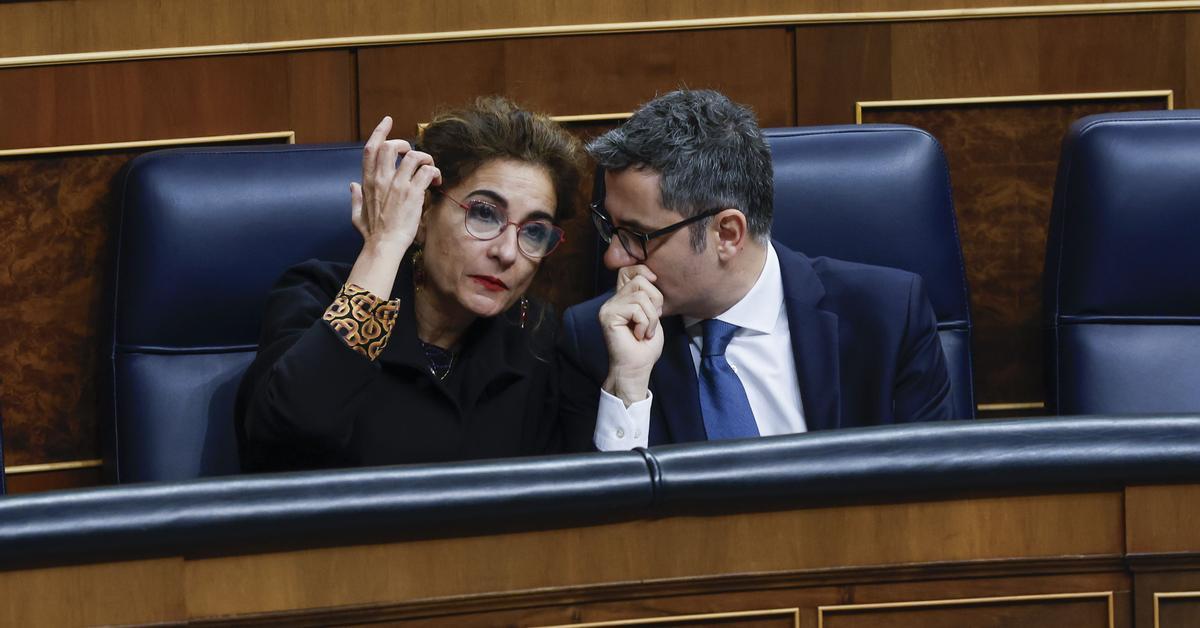
And now that? The question the day after the PSOE’s first parliamentary struggle so far in the Legislature has a first response from the Government: “We are in a moment of obvious difficulty, but our political position is firm and also understandable.” Those who speak in this way in La Moncloa about Junts’ ‘no’ to the amnesty law are also categorical in what their position will be when the text returns to the Justice commission and the neo-convergent amendments have to be discussed again to include all the crimes of terrorism in addition to that of treason to the State that now, years later, different judicial instances accuse the process. “The constitutionality of the law and neither will legal security be put at risk,” they say.
All this after on Tuesday in Congress the 171 yeses of the groups that support the legislature were defeated by the 179 noes added by the PP, Vox, UPN and the seven deputies of Junts, and therefore an absolute majority was not achieved. required for an organic law. It was not just any norm, but rather the one on which the political debate par excellence of the Legislature pivots and was the main demand of the independentistas to invest Pedro Sánchez.
The socialists assure today that there is no room to negotiate the terms demanded by Puigdemont and they are sure that the Spanish understand perfectly the PSOE’s decision not to compromise this time with the demands of its parliamentary partners. The PSOE already had to swallow its own words when it established as a red line that the text included any mention of terrorism and agreed, days later, to include a kind of categorization of the crime to exclude from the amnesty only those that represented “a serious violation of the human rights”. A correction imposed by Junts that some socialists now consider should have been rejected and faced through a modification of the Penal Code that would reform the current definition of terrorism.
As surprised as they were upset with Junts because they voted against the same text for which they had voted in favor a week before, in La Moncloa they place the ball in the court of their partners and bear the responsibility that the law could derail in Congress with the following questions: “What is the alternative? Illegalize parties, as the right proposes? Return to the dirty war against the independence movement that the PP practiced during its governments?
“No one said it would be easy, but we took a path with pardons – continue the same interlocutors – that gave results. The next step to reduce tension was amnesty and we will continue to insist on that same path: dialogue so that the law does not have the opposite effect to that desired. Therefore, it is Junts who now has to ask itself the questions and decide if what is appropriate is to throw the rule in the trash.”
The Minister of Justice, Félix Bolaños, described this Wednesday as “incomprehensible” the position of Junts, which voted “hand in hand with the PP and Vox”, and defended that the law is “impeccable, absolutely constitutional and in accordance with European law.” . In statements to Cadena SER, he admitted that the text “is much more than a rule,” and defended that it cannot be improvised every minute, as has turned out after Judge García Castellón synchronized his orders with the processing of the rule to attribute terrorist acts to Puigdemont and the ERC leader Marta Rovira.
The PSOE is concerned that the text surpasses the filters of the Constitutional Court and the legal bodies of the EU that it may reach once approved. But, in reality, faced with this latest scene provoked by Junts to reject the text, the ministers are divided between those who maintain prudence and calm while waiting for Junts to reconsider its position and those, tired of putting on the handbrake in the face of the of Puigdemont, they challenge them to present a motion of censure in the company of the PP and Vox. “They need us more than we need them. What’s more, don’t they want amnesty? Perfect. Let them come back in September for it and in that case we will be the ones who will put them in the dilemma of returning to it in exchange for supporting the budgets for 2025.”
Given what may happen, in the PSOE they have already begun to talk about the general accounts for next year because they understand that those for 2023 are not only de facto extended into 2024, but are also “a kind of mixed bag.” in which everything fits, since they allow us to maintain the good rhythm of the economy and investments.”
Those who speak this way are those who believe that, having reached this extreme, it is almost better for Junts to maintain the ‘no’ to the amnesty in order to construct a story with which the PSOE can refute the right-wing mantra that Sánchez swallows with everything that the independentists impose to remain in power and that in Spain Pugidemont is in charge. This, of course, just 15 days before elections in Galicia, in which Feijóo has much more at stake than the continuity of the PP in the presidency of the Xunta and Sánchez may have the opportunity to dismantle the framework installed on a president subjected to the independence movement. .
Be that as it may, the Government believes that it also helps its position that ERC has shown greater sense in defending that the text that Junts rejected is “robust” and slippery, incidentally, that the neoconvergents have put the interests of the former president of the Generalitat first. to those of hundreds of independentists prosecuted by the process. “The amnesty is not about Puigdemont or Rovira, but about 1,500 people whose lives are in question,” said Republican deputy Pilar Vallugera. A statement that, in the opinion of the socialists, may have a cost for Junts, since its leaders would have to give many explanations to the possible beneficiaries of the rule as to why they would not be beneficiaries if it were to decline.
This being the case, there is no sign of an agreement on the amendments that are now returning to the Justice Commission for debate again on the near horizon, even though the general secretary of Junts, Jordi Turull, insists on saying that there is still There are 15 days left to improve it and his party is buying time with the objective of “protecting a comprehensive law.” Nor are they in Junts to give ultimatums to the PSOE: “We are not here to give threats,” Turull said this Wednesday in statements to RAC1. What is evident are new mutual signs of distrust.
Source: www.eldiario.es

